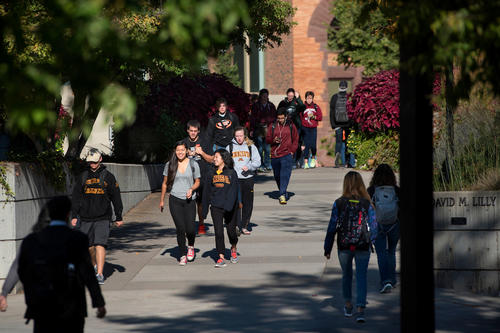
As part of the University’s continued work to increase institutional and philanthropic support for scholarships and financial aid to record levels, the University of Minnesota Board of Regents has advanced two important legislative requests—one that would enhance an existing program and a second that would launch a new effort to support campuses in Crookston, Duluth, Morris and Rochester, Minn.
While highlighting the strength of the U of M’s Promise Program, University leaders also detailed investment opportunities that could produce significant returns for students from middle-income families who tend to graduate with high levels of debt. Data shows that students graduating with the greatest average debt generally do not qualify for Pell or state grant funding nor existing University financial aid programs.
Promise scholarships have effectively minimized student loan debt for many students from low-income households in recent years, including the Promise Plus program that guarantees students from households earning less than $50,000 annually will pay no tuition at the U of M. The program also offers substantial assistance to many students from households above that threshold.
The University is seeking state funding to increase support for students who already participate in the Promise Program, and also extend this support to a much wider range of students. University leaders estimate that the number of Minnesota families supported by Promise scholarships would rise from the current number of around 13,000 to 17,000 or more—an increase of approximately 30 percent.
While the Promise Program applies on all five University campuses, the Board also discussed the Greater Minnesota Scholarship Program, which would provide significant first-year and ongoing scholarships to Minnesota high school graduates who enroll at the University’s Crookston, Duluth, Morris or Rochester campuses.
Statistics clearly demonstrate that Minnesota is a net exporter of college students by almost any measure, with more high school graduates from Minnesota pursuing higher education in nearby states than grads from those states coming to Minnesota for college. The Greater Minnesota Scholarship Program would be a useful tool in reversing that trend and keeping Minnesota students in-state and at the U of M.
By providing $4,000 to $5,000 first-year awards to qualified students, followed by $1,000 to $2,000 annual awards for their second, third and fourth years, the Greater Minnesota Scholarship Program would become an important recruitment strategy. Once fully phased in, University leaders estimate the program would support 8,500-9,500 Minnesota students, based on current enrollment levels, and could grow as enrollment levels climb in the future.
In addition to intersecting with multiple outcomes outlined in the University’s systemwide strategic plan, MPact 2025, these initiatives would build on other major investments in student success and reduced student debt from recent years, including:
- Increasing scholarships for low-income students in partnership with the University of Minnesota Foundation, including the Bentson Challenge Grant, which matches donations supporting low-income students.
- The creation of the Native American Promise Tuition Program, which provides substantial financial support, in many cases free tuition, to first-year undergraduate students and transfer students from Tribal colleges on the Crookston, Duluth, Rochester and Twin Cities campuses who are enrolled citizens in one of Minnesota’s 11 federally recognized Tribal Nations. Morris already provides free tuition to all members of any Tribal Nation.
- Systemwide scholarship efforts aimed at retention, an initiative the University piloted in Fall 2020 semester that produced strong student retention results from Fall 2020 to Spring 2021.
The Board also:
- Discussed aspects of the University’s legislative request that directly support improved access and healthcare for all Minnesotans, specifically design work for an academic health center in the Duluth Medical District and design and construction plans for a Health Discovery Hub on the Twin Cities campus.
- Continued a series of discussions on diversity, equity and inclusion work on the University’s Crookston and Morris campuses.
- Received the annual report from the Board’s student representatives.
The Board of Regents is scheduled to meet next on May 12-13, 2022. Visit regents.umn.edu for more information.
- Categories:
- Campus Affairs
- Board of Regents





